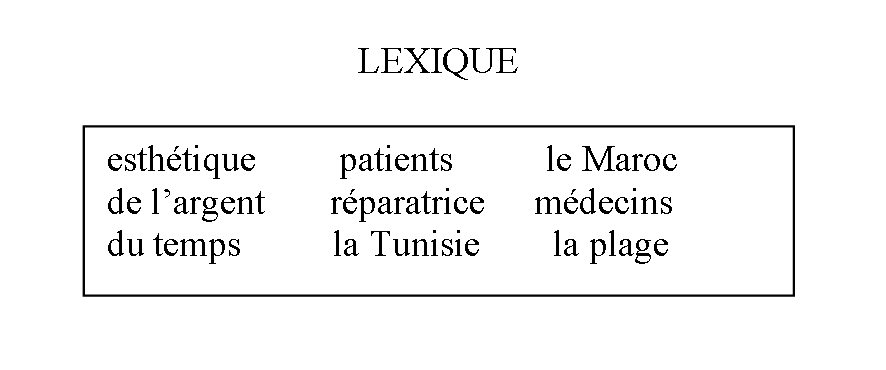C’est une vieille…
a. femme
b. homme
c. femmes
a. femme
You might also like to view...
La pelea. Ernesto está discutiendo (arguing) con su novia Marta en la cafetería y tú escuchas parte de su conversación. Escoge el verbo correcto y conjúgalo en el pretérito. MARTA: Anoche ____________________ (1. esperar / buscar) hasta las 10 de la noche. ¿Por qué no me _______________________(2. creer / llamar) por teléfono? ERNESTO: Anoche ____________________ (3. tener / tocar) que estudiar mucho para el examen de biología; Martín y Diego _______________________ (4. salir / estar) estudiando conmigo en la biblioteca.MARTA: Pero yo te ____________________ (5. buscar / pagar) en la biblioteca a las siete y ¡no te _____________________ (6. gustar / ver)!ERNESTO: A las siete nosotros ________________________ (7. decir / ir) a la
cafetería para comer. ¡Teníamos hambre!MARTA: Pero… ¿no __________________ (8. haber / poder) llamarme desde la cafetería?ERNESTO: Es que anoche no ______________________ (9. andar / traer) mi teléfono; lo dejé en el dormitorio…(2) Fill in the blank(s) with the appropriate word(s).
II. CulturaCultura hispana Contesta las siguientes preguntas con información específica. ¿Por qué exploraron Panamá Núñez de Balboa y Cristóbal Colón?
What will be an ideal response?
Use a word from the lexique to complete each sentence. You will not use all of the words

1. Le tourisme médical s’est récemment développé parce qu’on peut économiser (save) _______________ en quittant l’Europe de Ouest pour certains services médicaux.
2. _______________ est une des premières destinations pour le tourisme médical.
3. La majorité des _______________ qui offrent ces services ont étudié en Europe ou aux États-Unis.
4. Les patients-touristes peuvent récupérer sur _______________.
5. Le tourisme médical concerne essentiellement la chirurgie _______________.
Compound subjects joined by and take a __________________ (singular/plural) verb form
Fill in the blank(s) with correct word